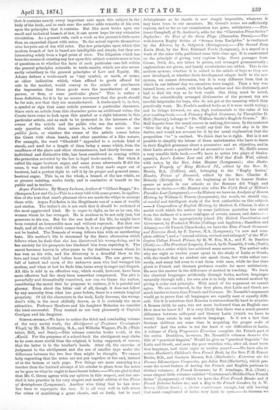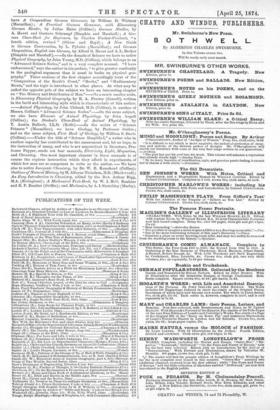SCHOOL - BOOKS. — We have to notice the third and concluding volume of
the very useful work, the Abridgment of Professor Co nington's Virgil, by Mr. H. Nettleship, MA., and Wilhelm Wagner, Ph.D. (Whit- taker, Bell, and Sons).—This volume contains books v.-xii. of the Sneid. For the purposes of a school-book the abridgment may claim to be even more useful than the original, it being supposed, of course, that the latter is in the teacher's hands. After all, the exercise of judgment in the abridgment and the use of smaller type make the difference between the two less than might be thought. We cannot help regretting that the notes are not put together at the end, instead of at the bottom of each page. Few things are more annoying to a teacher than the hurried attempt of his scholar to glean from the notes as he goes on what he ought to have learnt before.—We are glad to find that Mr. C. Green agrees with our opinion in this respect, and has car- ried it into practice in his very elegant and useful edition of the Peace of Arietophanes (Longmans). Another wise thing that he has done has been to expurgate the text. It is all very well to talk about the crime of mutilating a great classic, and so forth, but to read Aristophanes as he stands is now simply impossible, whatever it may have been to our ancestors. Mr. Green's notes are sufficiently copious, and as far as our examination has gone, satisfactory.—Pro- fessor Campbell, of St. Andrew's, edits for the "Clarendon Press Series" Sophocles : the Text of the Seven Plays (Clarendon Press).—Tbe well-known Rugby Series of "Scenes from Euripides" is continued by the Electra, by A. Sidgwick (Rivingtons).—The Second Easy Latin Book, by the Rev. Edmund Fowlo (Longman), is a sequel to a work of the same title, published some little time ago. It is constructed on the principle of giving very copious help. Short passages from Caesar, Ovid, &c., are taken to pieces, and arranged grammatically ; explanations are given, and handy vocabularies are added. This is the modern system; whether it is suited to the minds of boys as they are now developed, or whether their development adapts itself to the new system, we cannot determine, but it is very different from that in which in our fathers' day we ourselves were taught. Then a boy was turned loose, so to speak, with his Latin author and his dictionary, and had to find his way as he best could. One thing must be noted, that the scientifically arranged dictionaries of the present day are terrible labyrinths for boys, who do not got at the meaning which they practically want. Mr. Fowle's method looks as if it were worth trying; and ho brings forward, we see, high testimonials to the value of his first reading-book.—A Primary English Grammar, by Theophilus D. Hall (Murray), belongs to "Dr. William Smith's English Coarse." Mr. Hall departs from the usual course in makingfive cases. In the sentence "Give tho dog a bone," he would say that the word dog is in the dative, and would not account for it by the usual explanation that the preposition "to" is omitted. We think that he is right. But is it not possible to simplify the labour of those unfortunates who have to learn in their English grammar about a possessive and an objective, and in their Latin about a genitive and an accusative case? Mr. Hall's seems a very sensible little book.—We have to notice two plays of Shake- speare's, Love's Labour Lost and All's Well that Ends Well, edited. with notes, by the Rev. John Hunter (Longmans); also Shake- speare's Tragedy of King Richard IL, edited by the Rev. D. Morris, B.A. (Collins), and, belonging to the "Rugby Series,' Hamlet, Prince of Denmark, edited by the Rev. Charles E. Moberly (Rivingtons). We are beginning at last to honour Shake- speare as much in our schools as the Romans did Virgil and Horace in theirs.—Mr. Hunter also edits The Fifth Book of Milton's Paradise Lost (Longmans).—In History we have an Analysis of Roman History, by William C. Pearce (Longmans), the result, we should say, of careful and intelligent study of the best authorities on this subject. —A Compendium of English History, by Herbert R. Clinton, is also a useful work which the author by some judicious quotation has saved from the dullness of a mere catalogue of events, names, and dates.— With this may be appropriately joined The British Constitution and Government, by Frederick Wicks (Collings and Appleton ; Hamilton and Adams).—Of French Class-books, we have the Eton French Grammar. and Exercise Book, by F. Tarver, M.A. (Longman), "a new and com- plete edition"; and a "second edition, revised and enlarged," of the Wel- lington College French Primer, by H. W. Eve, M.A., and F. do Bandiss (Nutt).-- The Practical Linguist, French, by D. Nesmith, 2 vols. (Nutt), belongs to a series which has achieved some success. The author asks why are eight or twelve years spent in the study of Latin or Greek, with the result that no student can speak them, few write either cor- rectly, and many fail even to read them with ease, while far less time given to French and German produces results far more satisfactory. He sees the answer in the difference of method in teaching. We learn the classical languages artificially through books, modern languages naturally through talk ; his own aim is to help this natural method by giving it order and principle. With much of his argument we cannot agree. We are convinced, in the first place, that Latin and Greek are much harder to learn than French and German. Mr. Nesmith's argument would go to prove that all languages are equally easy or equally diffi- cult. Yet it is notorious that Russian is extraordinarily hard to acquire. A Roman child, ho says, was not more backward than an English one. How does he know it? It is very likely that there was a much greater difference between colloquial and literary Latin (which we have to learn) than exists in any modern language. Is it not a fact that German ohildren are some time in acquiring the proper order of words? And the order is not the least of our difficulties in Latin. A volume of Forty Progressive Exercises complete the French part of the series. Doubtless, however, Mr. Nasmith's volumes deserve the title of "practical linguist." Would he give us "practical linguists " for Latin and Greek, and save the poor wretches who, after all, must learn that language, half their eight or twelve years?—We have also to notice Hachette's Children's Own French Book, by tho Rev. P. H. Ernest Brotte, B.D., and Gustave Masson, B.A. (Hachette); Exercices sur les Formes ldiomatigues Comparees, par Jules Bud (Hachette), which pre- sents the novel feature of having the French and English portions in distinct volumes; A French Grammar, by F. Armitage, M.A. (Nutt) ; some elegant little volumes entitled "Contanseau's Middle-Class French Series" (Longmans), of which we have the First French Reader and A French Delectus before us; and a Key to the French Genders, by A. W. Brown (Elliott Stock), a clover contrivance enough, but still leaving that most complicated of locks very hard to open.—In German we 'have A Compendious German Grammar, by. William D. Whitney (Macmillan) • A Practical German Grammar, with Elementary German Reader, by Julius Maier (Collins); German Studies, by A. Havet and Gustave Schrumpf (Simpkin and Marshall) ; A Ger- man Class-Book for Beginners, by Charles Fischer-Fischart, "a fourth edition, revised " (Oliver and Boyd) ; A New Guide to German Conversation, by L. Pylodet (Macmillan); and German Composition, English into German, by Alfred G. Havet and A. L. Becker (Simpkin and Marshall).--In the domain of Science we have to notice Physical Geography, by John Young, M.D. (Collins), which belongs to an "Advanced Science Series," and is a very complete manual. "I have endeavoured," says the author in his preface, "to give greater continuity to the geological argument than is usual in books on physical geo- graphy." Three sections of the first chapter accordingly treat of the "Composition of the Earth's Crust," "Rocks," and "Rudimentary Strata," and the topic is introduced in other places. At what may be called the opposite pole of the subject we have an interesting chapter on " The History and Distribution of Man."—On a much smaller scale, is Elementary Physical Geography, by R. A. Proctor (-Cassell), written in the lucid and interesting style which is characteristic of this author. —Animal Physiology, by John Cleland, M.D. (Collins), is another of Messrs. Collins's "Advanced Science Series."---On the same subject, we also have Elements of Animal Physiology, by John Angell (Collins); the Student's Class-Book of Animal Physiology, by T. Austin Bullock, LL.D. (Relfe).—In the series of " Science Primers " (Macmillan), we have Geology, by Professor Goikie ; and on the same subject, First Book of Geology, by William S. Davis (Collins).—Under the title of "Science Simplified," a writer who in another capacity has contributed to the amusement and, lot us hope, to the instruction of many, and who is not unpractised in literature, Pro- fessor Pepper, sends out four manuals, Electricity, Light, Magnetistn, and Chemistry. One most important element in these manuals is of course the copious instruction which they afford in experiments, of which few men are so competent to write as the author. — We have also to notice Inorganic Chemistry, by Dr. W. B. Kemshead (Collins); Outlines of Natural History, by H. Alleyne Nicholson, M.D. (Blackwood) ; An Easy Introduction to Chemistry, edited by the Rev. Arthur Rigg, M.A. (Rivingtons); A Mechanical Text-Book, by W. L McC. Rankine and E. F. Bamber (Griffin); and Mechanics, by A. L Sketchley (Mnrby).



































 Previous page
Previous page